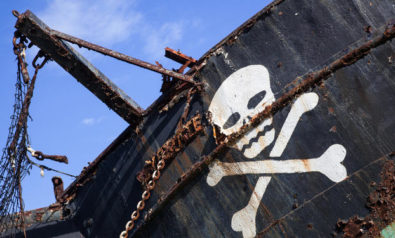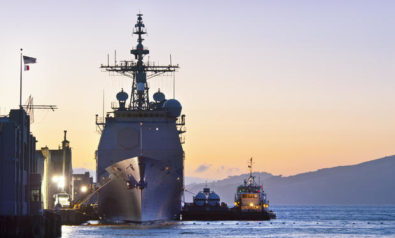
Maritime Piracy is bleeding the global economy and fostering political instability on the eastern and western shores of Africa more gravely than we realise.
Re-emergence of maritime piracy, one of the world’s oldest crimes, in the past decade has grown into a serious global security concern alongside terrorism and religious extremism. Rising number of attacks in recent years on merchant vessels to seize goods and hostages in exchange for ransoms running in millions of dollars has prompted an urgent concerted international naval campaign to protect arterial sea routes and shipping lanes. Earlier maritime robbery was mostly confined to hotspots around Malacca Strait, South China Sea, coastal areas off Peru and Brazil, and waters between India and Bangladesh but an explosive growth in pirate activities in Horn of Africa and Gulf of Guinea has turned African waters into the world’s piracy haven.
The phenomenal rise in pirate attacks in Somali waters and the Gulf of Aden since 2007 in particular has escalated the maritime threat to a whole new level. According to International Maritime Bureau (IMB), Somali pirates were behind 40% to 60% of all the hijacking incidents between 2007 and 2012. Using sophisticated techniques they have raided shipping vesselsas far east as the Maldives including Seychelles and as far south as the Mozambique Channel including Kenya and Madagascar. In 2010 – the year with the highest number of kidnappings at sea – Somali pirates had seized 86% of all hostages. According to a Chatham house expert, average ransom payments to Somali pirates in 2011 were above $5 million almost making piracy the second largest generator of money in the country bringing in over $200 million every year.
While emergence of piracy in Somalia is ascribed to the absence of a central governing authority and civil war raging in the country since 1991, pirate attacks in the Gulf of Guinea have been linked to social and economic inequalities rife in the region. West Africa is home to the continent’s richest oil and hydrocarbons reserves, which paradoxically have brought more poverty than prosperity in the region due to widespread exploitation and corruption.
A dangerous combination of inadequate maritime policies, rampant corruption, poor governance and lack of cooperation between the oil producing states has allowed criminal networks to exploit gaps in security, thus fuelling piracy in the Gulf of Guinea. Armed with sophisticated weapons pirates are targeting oil tankers and selling off their loot on the black market for large profits. Maritime security experts are now worried that pirate attacks off the Western coast are not only growing in number and range they are also getting extremely violent.
Piracy in Southeast Asia has been linked with robbery of fishing products and merchant cargos, with Malacca Strait being the most active piracy hotspot in the region. According to IMB, Asia was the most ‘pirate-infested’ region in the world from 1992 to 2006 prompting Indonesia, Malaysia, Thailand and Singapore to launch joint patrolling campaigns including two warships. Territorial waters of Bangladesh, on the other hand, are now deemed safer than before after local authorities stepped up vigilance against pirate activities in recent years.
Why is it relevant?
Shipping accounts for nearly 80% of the global trade goods movement. According to Ocean Beyond Piracy (OBP) project, maritime industry is responsible for carrying and transporting over 6 billion tons of cargo and represents nearly 93,000 merchant vessels and over 1.25 million seafarers. Various estimates assess sea piracy is setting back global economy by up to $12 billion each year. According to the OBP report, the direct economic cost of piracy now includes the cost of high ransoms, piracy insurance premiums, deterrent equipment such as arms and weapons, re-routing vessels to avoid pirate attacks, naval deployment in pirate hotspots, piracy prosecutions and organisation budgets dedicated to reducing piracy. Secondary and less visible effects of piracy, on the other hand, have manifested in losses to local regional trades in countries such as Taiwan, Nigeria, Yemen and Seychelles. But more damagingly, high insurance and operational costs have resulted in inflation in food prices and loss of foreign revenue in some of the poorest countries most affected by piracy such as Mozambique and Somalia.
The rise in maritime piracy on the most vital global shipping routes is equally worrisome for the developed world because of its huge potential to disrupt global energy supplies. While Malacca Strait provides passage to 30% of the world trade and half of the global oil shipments, Gulf of Guinea supplies nearly 40% of Europe’s oil and 29% percent of America’s. Gulf of Aden, on the other hand, is home to an arterial sea-lane at the mouth of Red Sea providing passage to Persian oil, which supplies 11% of the global energy demand.
For more than 10 years, Fair Observer has been free, fair and independent. No billionaire owns us, no advertisers control us. We are a reader-supported nonprofit. Unlike many other publications, we keep our content free for readers regardless of where they live or whether they can afford to pay. We have no paywalls and no ads.
In the post-truth era of fake news, echo chambers and filter bubbles, we publish a plurality of perspectives from around the world. Anyone can publish with us, but everyone goes through a rigorous editorial process. So, you get fact-checked, well-reasoned content instead of noise.
We publish 2,500+ voices from 90+ countries. We also conduct education and training programs on subjects ranging from digital media and journalism to writing and critical thinking. This doesn’t come cheap. Servers, editors, trainers and web developers cost money.
Please consider supporting us on a regular basis as a recurring donor or a sustaining member.
Support Fair Observer
We rely on your support for our independence, diversity and quality.
Will you support FO’s journalism?
We rely on your support for our independence, diversity and quality.







